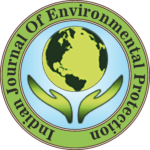IJEP 41(12): 1335-1344 : Vol. 41 Issue. 12 (December 2021)
Mausam Kumar Paul and Mithra Dey*
Assam University, Department of Ecology and Environmental Science, Silchar – 788 011, Assam, India
Abstract
Unscientific dumping of solid waste is a threat to the environment which causes an ecological imbalance with soil, water and air. The present study has been carried out to address the impact of solid waste disposal on seasonal water quality and the determination of the water quality index of the water bodies around the open municipality dump yard in Silchar city, Assam, India. Five sampling and three control points were selected from the different water bodies and analysed for selected physico-chemical parameters, like pH, electrical conductivity, total dissolved solids, free CO2, chemical oxygen demand, dissolved oxygen, total alkalinity, total hardness, calcium, magnesium, chloride, nitrate, phosphate and sulphate and accordingly water quality index has been calculated based on the seasonal data following standard methods. Most of the parameters of the sample sites exceeded the WHO standard limit for drinking water. The water quality index of the control sites was found good in all the seasons in contrast to the sample sites. Therefore, to protect the environment, it is very important to adopt proper scientific practices for waste disposal.
Keywords
Physico-chemical parameters, Water quality index, Municipal solid waste, Pollution, Environment
References
- Manohara, B. and S.L. Belagali. 2014. Characterization of essential nutrients and heavy metals during municipal solid waste composting. Int. J. Innovative Res. Sci., Eng., Tech., 3(2):9664-9672.
- Singhal, S. and S. Pandey. 2001. Solid waste management in India : Status and future directions. TERI Information Monit. Env. Res. Tech., 6(1):1-4.
- Choudhury, M. and M. Choudhury. 2014. Trends of urban solid waste management in Agartala city, Tripura, India. Universal J. Env. Res. Tech., 4(4).
- Pandey, S.K., P. Tyagi and A.K. Gupta. 2007. Municipal soild waste management in Ghazipur city-A case study. J. Agric. Biol. Sci., 2(6):41-43.
- CPCB. 2017. Annual progress report. Central Pollution Control Board, New Delhi, India.
- Kansal, A., R.K. Prasad and S. Gupta. 1998. Delhi municipal solid waste and environment-An appraisal. Indian J. Env. Prot., 18(2):123-128.
- Nabegu, A.B. 2010. An analysis of municipal solid waste in Kano metropolis, Nigeria. J. Human Ecol., 31(2):111-119.
- Manfredi, S., et al. 2009. Land filling of waste : Accounting of greenhouse gases and global warming contributions. Waste Manage. Res., 27(8):825-836.
- Singh, S.K., et al. 2016. Greenhouse gas emissions from landfills : A case of NCT of Delhi, India. J. Cli-matol. Weather Forecasting. 4(1):157.
- CPCB. 2000. Management of municipal solid waste. Central Pollution Control Board, New Delhi, India.
- Sankoh, F.P., X. Yan and Q. Tran. 2013. Environmental and health impact of solid waste disposal in developing cities : A case study of granville brook dumpsite, Freetown, Sierra Leone. J. Env. Prot., 4:665-670.
- Abbas, T., et al. 2018. Impact of municipal solid waste on groundwater quality in Jhang city, Punjab, Pakistan. J. Biodiversity Env. Sci., 12 (1):134-141.
- Hossain, M.F., et al. 2018. Solid waste disposal and its impact on surrounding environment of Matu-ail landfill site, Dhaka, Bangladesh. American J. Env. Sci., 14(5):234.245.
- Choudhury, D. and S. Gupta. 2017. Impact of waste dump on surface water quality and aquatic insect diversity of deeper beel (Ramsar site), Assam, north-east India. Env. Monit. Assess., 180 (11): 540.
- Yogendra, K. and E.T. Puttaiah. 2008. Determination of water quality index and suitability of an urban waterbody in Shimoga town, Karnataka. Proceedings of Taal 2007: The 12th World Lake Conference. pp 342-346.
- Horton, R. K. 1965. An index number system for rating water quality. J. Water Poll. Control Fed., 37(3):300-306.
- Brown, R.M., et al. 1972. A water quality index-Crashing the psychological barrier. In Indicators of environmental quality. Springer, Boston, MA. pp 173-182.
- Tyagi, S., et al. 2013. Water quality assessment in terms of water quality index. American J. Water Resour., 1(3):34-38.
- Oni, O. and O. Fasakin. 2016. The use of quality index method to determine the potability of surface water and groundwater in the vicinity of a municipal solid waste dumpsite in Nigeria. American J. Eng. Res., 5(10):96-101.
- Singh, S., et al. 2016. Assessment of pollution potential of leachate from the municipal solid waste disposal site and its impact on groundwater quality, Varanasi environs, India. Arabian J. Geosci., 9(2):131.
- Misaghi, F., et al. 2017. Introducing a water quality index for assessing water for irrigation purposes: A case study of the Ghezel Ozan river. Sci. Total Env., 589:107-116.
- Paul, S., et al. 2019. Assessing the ecological impacts of ageing on hazard potential of solid waste landfills : A green approach through vermitechno-logy. J. Cleaner Production. 236(2):117643.
- Census of India. 2011. District census handbook: Cachar district. Registrar General of India.
- Trivedy, R.K. and P.K. Goel. 1984. Chemical and biological methods for water pollution studies. Environmental Publications, Karad.
- APHA. 2005. Standard methods for the examination of water and wastewater (15th edn). American Public Health Association, Washington D.C.
- Goswami, U. 2007. A study on solid wastes in Guwahati city. Ph.D. Thesis. Gauhati University, Guwahati.
- WHO. 2011. Guidelines for drinking-water quality (4th edn). World Health Organization, Geneva.
- Maiti, S.K., et al. 2016. Characterization of leach-ate and its impact on surface and groundwater quality of a closed dumpsite- A case study at Dhapa, Kolkata, India. Procedia Env. Sci., 35:391-399.
- Usman, M., et al. 2017. A case study of groundwater contamination due to open dumping of municipal solid waste in Faisalabad, Pakistan. Earth Sci. Pakistan. 1(2):15-16.
- Kumar, M. and A. Puri. 2012. A review of permissible limits of drinking water. Indian J. Occup. Env. Medicine. 16(1):40.
- Naveen, B.P., J. Sumalatha and R.K. Malik. 2018. A study on contamination of ground and surface water bodies by leachate leakage from landfill in Bangalore, India. Int. J. Geoeng., 9(1):27.
- Demirbilek, D., et al. 2013. Characterization and pollution potential assessment of Tunceli, Turkey municipal solid wate open dumping site leachates. Env. Monit. Assess., 185(11):9435-9449.
